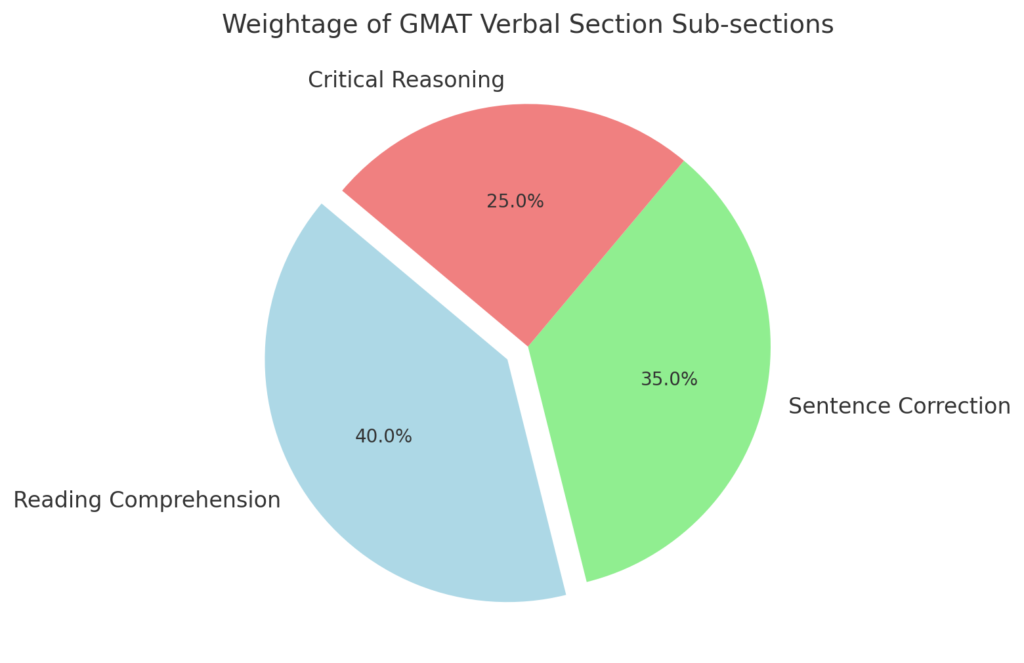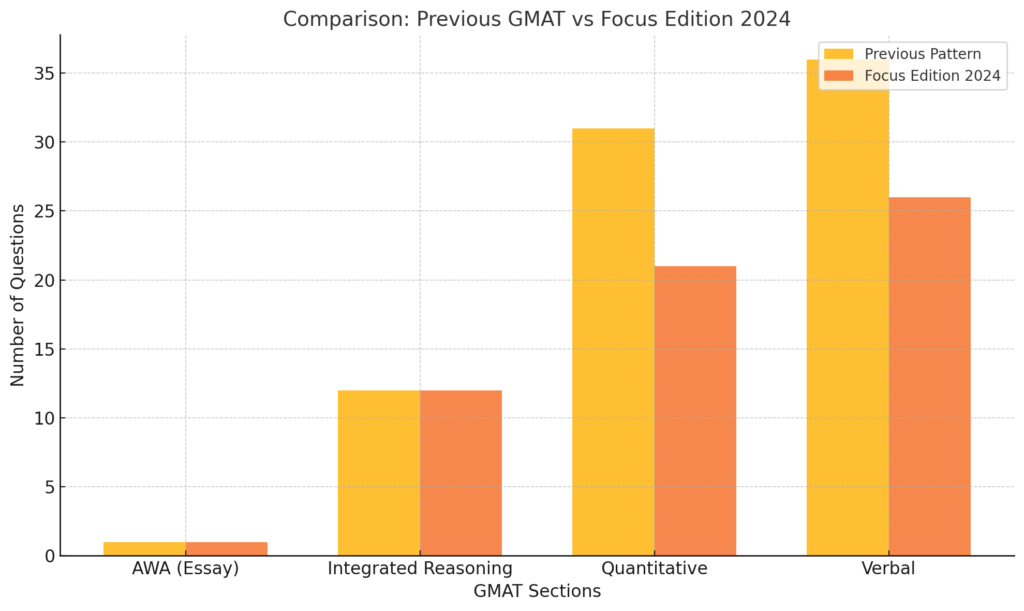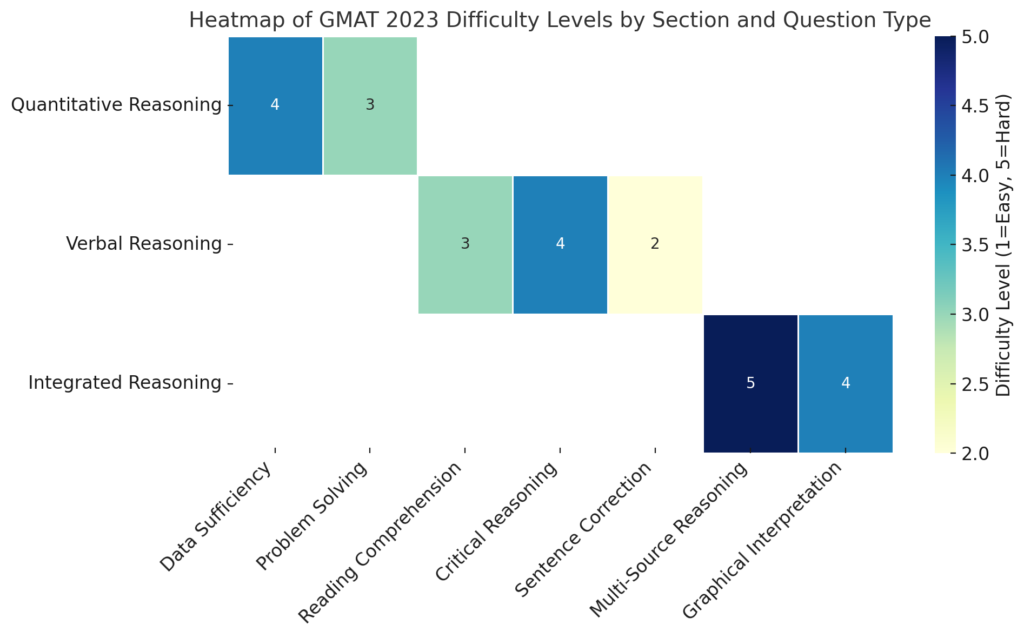Have you ever wondered what it takes to ace the GMAT and secure a spot at your dream business school? For students aiming to study abroad, the GMAT syllabus holds the key to unlocking top MBA and master’s programs worldwide. But navigating its components and preparing effectively can feel overwhelming. The GMAT, or Graduate Management Admission Test, is a globally recognized exam designed to assess critical thinking, analytical skills, and reasoning abilities required for business and management studies. Success in the GMAT not only demonstrates academic readiness but also strengthens your application to prestigious institutions.
This guide breaks down the GMAT syllabus for 2024, offering actionable insights into its exam pattern, verbal reasoning strategies, and preparation tips. Whether you’re just starting or refining your study plan, you’ll find everything you need to master the GMAT in this blog.
How Does the GMAT Syllabus Look Like?
The GMAT syllabus is meticulously designed to evaluate a candidate’s analytical, reasoning, and verbal abilities, essential for success in MBA programs. The exam is divided into four key components:
| Section | Skills Tested | Time Allocation |
|---|---|---|
| Analytical Writing Assessment | Critical thinking, argument analysis, and articulation | 30 minutes |
| Integrated Reasoning | Data interpretation, multi-source reasoning, and synthesis | 30 minutes |
| Quantitative Reasoning | Problem-solving and data sufficiency | 62 minutes |
| Verbal Reasoning | Reading comprehension, critical reasoning, and grammar | 65 minutes |
Each section plays a vital role in assessing the skills valued by business schools. The Analytical Writing Assessment (AWA) tests your ability to dissect an argument and present a coherent critique. Integrated Reasoning evaluates how well you interpret complex data, a critical skill in decision-making. The Quantitative section requires mathematical proficiency, while Verbal Reasoning ensures command over language and logical reasoning.
GMAT Verbal Syllabus & GMAT Critical Reasoning

The GMAT Verbal Syllabus is a crucial part of the exam, testing your ability to understand and analyze written material. It comprises three sub-sections, each focusing on distinct skills:
| Sub-section | Focus Area | Skills Tested | Weightage |
|---|---|---|---|
| Reading Comprehension | Understanding and evaluating written passages. | Identifying main ideas, inference, and logical relationships. | 40% |
| Sentence Correction | Assessing grammar and language usage. | Grammar, sentence structure, style, and conciseness. | 35% |
| Critical Reasoning | Analyzing and evaluating arguments. | Strengthening or weakening arguments, identifying assumptions, and evaluating logical consistency. | 25% |
Below is the visual breakdown of the Verbal section’s weightage to help prioritize preparation:

What’s GMAT Full Form?
Did you know the GMAT has been helping students pursue management education for over six decades? The Graduate Management Admission Test (GMAT), administered by the Graduate Management Admission Council (GMAC), is the standardized test for evaluating candidates applying to MBA, MiM, and other management programs worldwide.
A Brief History
The GMAT was first introduced in 1953 and has since evolved to meet the changing needs of business schools and students. Initially designed for the U.S. market, it now serves as a global benchmark for assessing analytical and decision-making skills.
Key Milestones of the GMAT:
- 1953: The first GMAT exam administered.
- 1997: Transition to computer-based testing.
- 2023: Introduction of the GMAT Focus Edition to simplify the test format.
GMAT Exam Pattern & GMAT Syllabus in 2024

The GMAT Exam Pattern 2024 reflects a refined approach to testing, designed to evaluate skills relevant to today’s business world. It consists of four sections:
| Section | Questions | Time | Scoring Range |
|---|---|---|---|
| Analytical Writing Assessment | 1 essay | 30 mins | 0–6 |
| Integrated Reasoning | 12 questions | 30 mins | 1–8 |
| Quantitative Reasoning | 31 questions | 62 mins | 6–51 |
| Verbal Reasoning | 36 questions | 65 mins | 6–51 |
Key Updates for 2024
- The GMAT Focus Edition condenses the test into fewer questions without compromising on assessment quality.
- New emphasis on critical reasoning and real-world applications across all sections.
- Enhanced flexibility in section order selection.
Common Myths About the Exam Pattern
- Myth: The Quantitative section requires advanced math knowledge.
Reality: It tests high school-level math concepts like algebra and geometry. - Myth: Integrated Reasoning has less weightage.
Reality: Top schools consider IR scores to assess decision-making ability.
e know your feedback before I proceed to the next ones!

What Are GMAT Total Marks?
The GMAT Total Marks system is unique, offering insights into your strengths across various sections. The GMAT provides a total score ranging from 200 to 800, derived from the Quantitative Reasoning and Verbal Reasoning sections.
Scoring Breakdown by Section:
| Section | Score Range | Contributes to Total Score |
|---|---|---|
| Analytical Writing Assessment | 0–6 | No |
| Integrated Reasoning | 1–8 | No |
| Quantitative Reasoning | 6–51 | Yes |
| Verbal Reasoning | 6–51 | Yes |
The AWA and IR scores are reported separately, giving business schools a comprehensive understanding of your capabilities, but they do not contribute to the total score.
How Percentile Ranks Work
- A GMAT score of 700+ typically places you in the 90th percentile, making you a competitive candidate for top programs.
- Understanding the percentile ranks helps you set realistic score targets based on your desired business school.
Actionable Insight: Focus equally on the Quantitative and Verbal sections to maximize your total score. Use official GMAT mock tests to benchmark your performance and percentile rank.
How Tough Is It to Prepare for the GMAT?
Preparing for the GMAT is often seen as challenging, but understanding its structure and practicing strategically can make the process manageable.
Challenges Test-Takers Face
- Time Management: Balancing work, studies, and GMAT preparation.
- Quantitative Skills: Revisiting high school math after years.
- Verbal Mastery: Tackling complex reading passages and grammar rules.
- Test Anxiety: Performing under timed conditions.
Strategies to Overcome These Challenges
- Time Management: Create a detailed study plan and allocate daily time slots for each section.
- Quantitative Skills: Use online resources like Khan Academy to brush up on algebra and geometry.
- Verbal Mastery: Practice reading editorials and solving sentence correction problems.
- Test Anxiety: Take timed practice tests to simulate the real exam environment.
GMAT Difficulty Compared to Other Exams
| Exam | Focus Area | Difficulty |
|---|---|---|
| GMAT | Analytical and reasoning | Medium to High |
| GRE | General aptitude | Medium |
| CAT (India) | Quant-heavy | High |
Actionable Insight: Recognize your weak areas early and invest more preparation time into improving them. The GMAT isn’t about intelligence but about strategy and persistence.
How Much Time Is Needed to Prepare for GMAT? (Weekly Schedule)

Preparing for the GMAT depends on your starting point, learning pace, and available time. On average, 2–3 months of consistent preparation is sufficient for most test-takers. However, this can vary based on your familiarity with the syllabus.
Recommended Preparation Timelines
- Beginner (3–4 months):
- Ideal for candidates with little to no prior exposure to standardized tests.
- Requires a slow, steady approach with daily 2–3 hours of study.
- Intermediate (2–3 months):
- For those comfortable with basic concepts but needing improvement in speed and accuracy.
- Involves focused section-wise practice and regular mock tests.
- Advanced (1–2 months):
- Suitable for individuals who have taken the GMAT before or are naturally adept at analytical reasoning.
- Prioritizes reviewing errors, taking advanced-level mocks, and improving test-taking strategies.
Sample Weekly Study Schedule for Intermediate Test-Takers
| Day | Focus Area | Time | Activities |
|---|---|---|---|
| Monday | Verbal Reasoning | 2 hours | Practice Reading Comprehension and Critical Reasoning. |
| Tuesday | Quantitative Reasoning | 2 hours | Solve Data Sufficiency and Problem Solving questions. |
| Wednesday | Integrated Reasoning | 1.5 hours | Practice Multi-source Reasoning and Graph Interpretation. |
| Thursday | Verbal Reasoning | 2 hours | Focus on Sentence Correction. |
| Friday | Mock Test (Full Length) | 3 hours | Analyze mistakes and work on weak areas. |
| Saturday | Quantitative Reasoning + Review | 2 hours | Review formulas and solve timed practice sets. |
| Sunday | Mixed Practice + AWA Writing | 3 hours | Attempt a mini-mock and practice essay writing. |
Actionable Insight: Customize this plan based on your personal strengths and availability. Regular reviews of your performance can help refine your strategy and boost efficiency.
What’s the GMAT Exam Fees?
The GMAT Exam Fees vary by region but generally fall within the range of $275–$300 USD. It’s essential to budget for additional costs like rescheduling or cancellation.
Detailed Breakdown of GMAT Fees:
| Service | Cost (in USD) |
|---|---|
| GMAT Exam Fee | $300 |
| Rescheduling Fee (More than 7 days before the exam) | $60 |
| Rescheduling Fee (Within 7 days) | $150 |
| Cancellation Fee (More than 7 days before the exam) | $80 refund |
| Cancellation Fee (Within 7 days) | No refund |
Regional Variations
- India: Approx. ₹25,000 (includes taxes).
- USA: $300 USD, excluding additional charges.
Budgeting Tips:
- Schedule your exam well in advance to avoid rescheduling fees.
- Take sufficient practice tests to ensure readiness, reducing the need for retakes.
What Is GMAT Focus Edition Syllabus? How Is It Different?
The GMAT Focus Edition is the latest update to the exam, designed to better align with the evolving needs of business schools and candidates. Introduced in 2023, this edition streamlines the syllabus while retaining its core emphasis on critical thinking and problem-solving skills.
Key Changes in the GMAT Focus Edition
| Aspect | Previous GMAT | GMAT Focus Edition |
|---|---|---|
| Sections | Quant, Verbal, IR, AWA | Quant, Verbal, and IR only |
| AWA | Included | Removed |
| Question Count | ~80 questions total | Fewer questions (~65 total) |
| Section Order Selection | Limited | Fully customizable |
| Focus Areas | Broad reasoning capabilities | Real-world problem-solving skills |
Why the Change?
The GMAT Focus Edition emphasizes efficiency and relevance. With fewer but more targeted questions, candidates can complete the test faster while showcasing the skills that matter most to business schools.
What Remains the Same?
- Scoring remains on a 200–800 scale.
- Verbal and Quantitative Reasoning are the primary contributors to the total score.
- Integrated Reasoning retains its importance for data interpretation.
How Was GMAT’s Last Year Paper?
Analyzing past papers is crucial for understanding trends and question patterns. The 2023 GMAT paper revealed a continued emphasis on reasoning skills, with an increasing focus on real-world applications, particularly in the Integrated Reasoning section.
Key Observations from GMAT 2023
- Quantitative Reasoning:
- High focus on data sufficiency problems (60%).
- Arithmetic topics like percentages and ratios dominated.
- Verbal Reasoning:
- Critical Reasoning questions saw a slight increase (30% of Verbal).
- Reading Comprehension passages were shorter but denser in content.
- Integrated Reasoning:
- Multi-source reasoning questions were the most challenging.
- Graphical interpretation questions appeared more frequently.
What to Expect in 2024
- A continuation of real-world problem-solving in all sections.
- Shorter but trickier reading passages in Verbal Reasoning.
- Increased importance of question interpretation over rote knowledge.
A heatmap showing the difficulty levels of each section in the 2023 GMAT paper.

Conclusion
Preparing for the GMAT can seem daunting, but with a clear understanding of the GMAT syllabus, exam pattern, and strategic preparation plan, success is well within reach. The GMAT not only tests your academic abilities but also challenges your time management and decision-making skills, traits essential for excelling in business school and beyond.
Whether you’re tackling the Verbal section’s nuances or mastering the Quantitative questions, consistent effort, practice, and the right resources can help you achieve your target score. Stay informed about updates like the GMAT Focus Edition, and leverage insights from past papers to refine your preparation strategy. Remember, the GMAT is not just a test of knowledge; it’s a test of strategy. With determination and effective planning, you can ace it and take the first step toward your dream MBA or master’s program.




